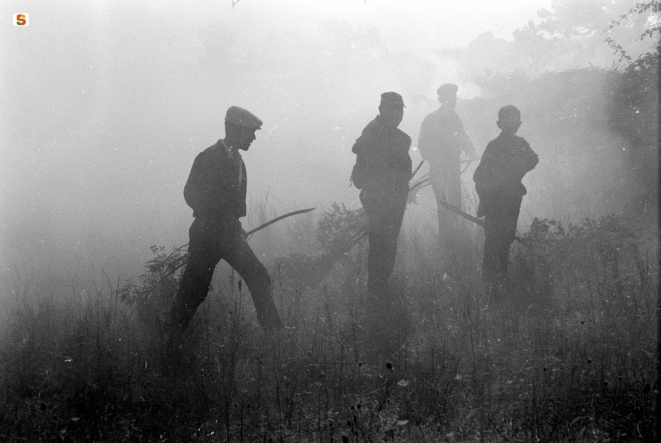Bandidos
Banditry In Sardinia in the 1800s
For trying to understand the phenomenon of banditry in Sardinia in the 1800s, it is necessary to start with a historic consideration, as obvious and well known as essential: Sardinia suffered a bewildering series of dominations. Alberto Lamarmora in the book Voyage en Sardaigne wrote: “Whichever other population that, for many centuries, had found these negative circumstances like those that encumber on this Region, would not have been either so patient or so docile”.
With no doubts, at the base of this phenomenon, there is the condition of epochal mistreatment suffered by Sardinian citizens, intensified enormously in the 1800s. A quick historic excursus is important to clarify better the analysis. Beginning from the process of Roman domination of the Island that, in the Barbagia – the inside mountainous area – was not a true subjection. The Barbagia personifies mountain, it is the shelter of freedom, an Island into the Island that has not the sea as a limit, but other land.
The Roman domination of the Barbagia gave as heritage not only a big archaeological patrimony, but a significant mark on the language – the language spoken in the Barbagia, called "barbaricino", is the language with which the Latin language persists in a way that is clearer than other Romance languages of Europe. Romans before and Christianity then, spread slowly with other populations "come from the sea": Vandals, Byzantines, Pisa people, Aragon people, Spanish, Piedmonteses. For the populations of the hinterland and above all of the Barbagia, sea was immediately associated to a negative element that brought misfortune.
In addition to the historic phenomenon of dominations, always too hard, banditry that increases and develops exclusively in the inside areas in the 1800s, was characterized, since the birth, by some contingent factors: the abolition of the feudal system with the consequent elimination of the "ademprivio" - namely the common, civic and collective use of a land; use of a land by all the people in a public way – and the Edict of the "chiudende" – the closure of fields. Factors that in these areas generated some pains, revolts and atrocities more than other. The collective management of land was a cornerstone of the Sardinian society. The end of this community system of ancient direction and the demise of feudal system created a devastating hate by Sardinian people. The Government redeemed feuds and it appeared as a very hard collection agent, applying the reform damaging farmers and shepherds.
So it was born the irreconcilable contrast between Government and Sardinia, Continent and Island, City and country, that increased incredibly in the hinterland of the Barbagia, marginalized and excluded from whatever process of development. In these areas it was created an archaic way of resistance. A resistance always present despite almost never unitary and not always messenger of positive values. It had a very solid base: keeping intact the inside status; it had to stay again su connottu, “the known”; they had to persist the same traditional laws intensely well-established.

In light of this fact, it is natural to identify the Sardinian banditry as a phenomenon of reaction to the system. A phenomenon of rebellion of the pastoral culture, strong and homogeneous only in the moment when it must think defending itself. A resistance unable to offend and insufficiently interested to expand. So can we talk about revolution? Not exactly. It lacked a true political creed to support it.
The Sardinian banditry is an illegal and criminal activity with distinctive features and traits that make it different to other criminal activities spread all over the world, because ways, reasons, the social-economic and cultural context are more different than other illegal phenomena.
But what events and what behaviors represent the Sardinian banditry in the 1800s? Which element can be recognized as the effective symbol of the Sardinian banditry and in what conditions does not that element belong to? Celebrated academics and anthropologists understood completely this phenomenon. We just tell that it is essential to start studying the word "banditry", trying to delimit firstly the meaning so wide that this word had. Considering "banditry" everything is called "banditry" but it is not, it is one of the most common mistake.
The history of banditry that we want to tell is that part closed by the clear and well outlined limits. It is that called "romantic and passionate banditry" by Gramsci. The primordial banditry. Getting out of this well-defined space is hard anyway, because events, rules, origins and necessities are not so easily classifying under an only word. Not contextualizing means doing violence and it does not help the idea according to which in the common conception we are sometimes inclined to generalize. This procedure will rehabilitate or will discredit some bandits, but it is a path that follows the clear idea by Gramsci. Feminine figures will not lack, the women bandits who marked an indelible sign in history.
Today the aura that covered the Sardinian bandit of the 1800s has been going away. The romantic features of the ancient banditry and of the idea of resistance were mistreated, made bad and lacerated and above all destroyed by the current criminal systems. That aura was brought back to the top mainly by Literature. Some examples: the novels by Costa, Fois, Dessì, Ricci, without forgetting the intellectual contribution by Gramsci but also Sebastiano Satta, Michelangelo Pira, Bachisio Bandinu, Antonio Pigliaru, Emilio Lussu and Giuseppe Fiori.